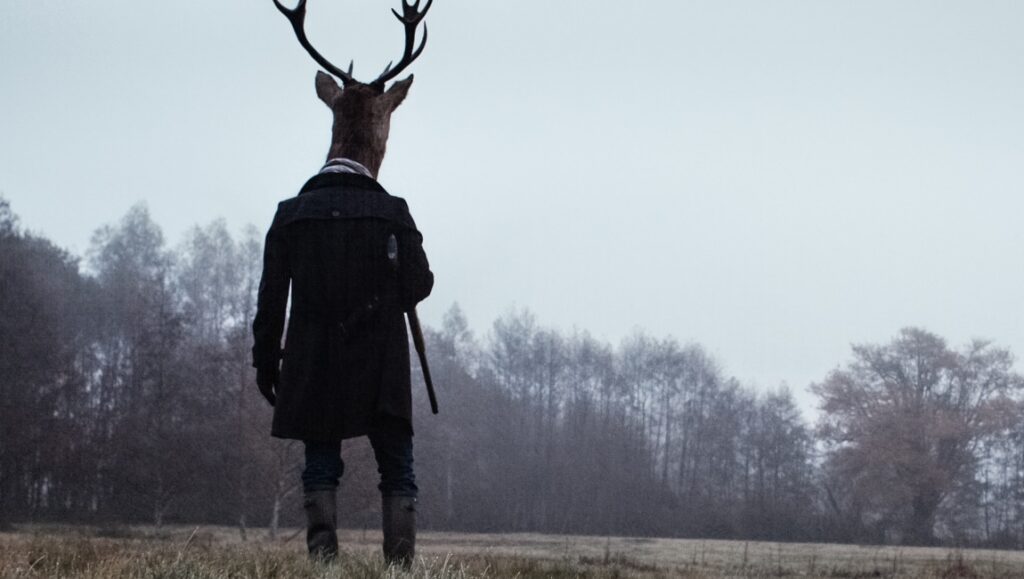Anonymous Animals is repetitive, unimaginitive, and facile in boths its ideas and images. Anonymous, indeed.
If, for some misguided reason, you feel the need to create a vegetarian/vegan polemic, there aren’t all that many benchmarks to hit. In fact, it’s fair to say that there is only one question you should have to ask: can you make a better movie than Chicken Run? It seems like none of the creators behind Anonymous Animals thought to ask that question. Starting from the initial premise of a world where animal-human power dynamics are reversed, Baptiste Rouveure’s Anonymous Animals sets its sights on an atmospheric series of vignettes, each following a different “animal”: a cow operating a factory farm full of humans, a dog and the pet it abuses, and an ominous stag who stalks the forest, rifle in hand.
The vignettes are served with heavy lashings of horror elements, and the initial premise isn’t entirely hopeless, which might lead you (as it did this critic) to assume that there might be something interesting here. Unfortunately, that isn’t the case. Instead of approaching the image of humans as animals with the nuance or brutality of a work like Agustina Bazterrica’s novel Tender Is The Flesh, Anonymous Animals seems to expect its visuals to do the heavy lifting. This results in imagery that is already quite obvious being wielded as a blunt-force weapon, relentlessly beating the audience over the head until all that can be done is to roll your eyes. It’s not like Rouveure doesn’t have a good argument — in every case, his point is one that few people would disagree with, and veganism is an increasingly popular lifestyle choice — but in trying to sway viewers to his side, he employs the broadest of arguments, making no more nuanced a statement than “humans bad.” His are arguments that might have been considered edgy or bold a decade ago, but the film brings nothing new to the table — of course audiences will be horrified by factory farming and the abuse of pets, but Rouveure’s allegory is not the source of any of that horror. Perhaps even worse than this is that the film regurgitates these points carelessly, spouting false equivalencies that make little sense, such as a scene which implies that feeding dogs meat diets is akin to cannibalism. Anonymous Animals reveals nothing new, simply hammering home talking points that all of us have already heard countless times before, and not even bothering to refine those talking points into their sharpest forms.
Beyond the clunky, misguided messaging, Anonymous Animals doesn’t even succeed in its most basic capacity as a horror movie. The film has exactly one interesting shot, in which the antlers of a stag rise behind his human prey, repositioning the human as quarry in an admittedly striking fashion. After this all-too-brief moment of competence, the film becomes entirely mundane, constantly recycling the same images, submitting to a dank color palette that is blander than a Marvel movie, and neglecting to employ much of the horror that seems screamingly obvious. The factory farm is perhaps the clearest of these omissions, with the real horror of that situation diminished perhaps by budgetary constraints, but also by a lack of creativity. Sure, there are cattle prods and some decent performances from the actors involved who have remarkably little to work with given that they are limited mostly to various facial expressions of worry and anguish, but Rouveure’s factory farm seems, if anything, quite spacious, as opposed to the claustrophobic cruelty of what animals actually endure. Again, a brief moment of hope for something interesting appears at the end of this vignette, with an escape scene that does spark some interest, but the moment is lost among the drek that constitutes the remainder of the film. With sound design that repeats the same horror-movie strategy of rising white noise followed by abrupt silence and cuts to black, Anonymous Animals feels like little more than a series of short films contorted and stretched to feature length, no matter how much they resist that form. What’s left isn’t much of a movie, let alone a good horror one, but instead just a mildly unsettling PETA advert.


Comments are closed.